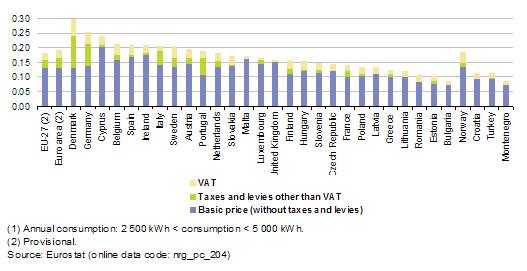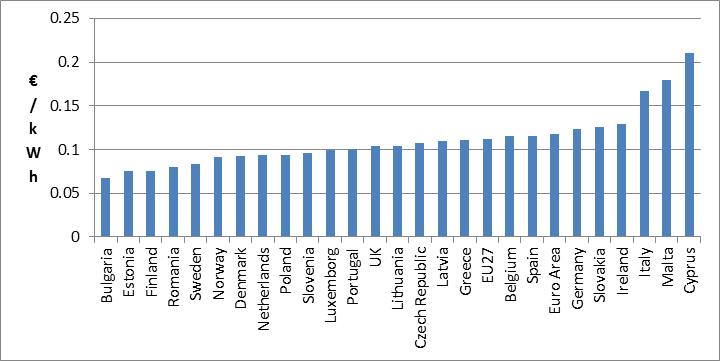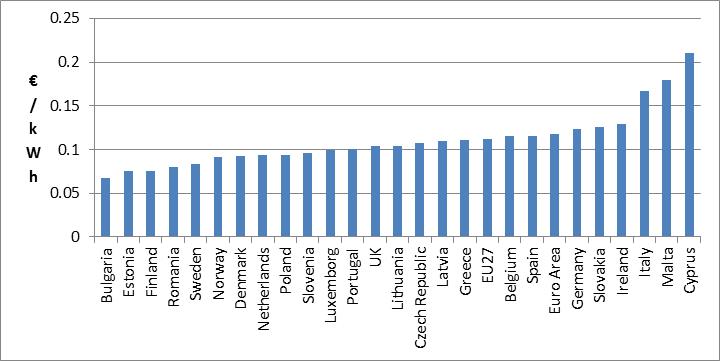 Green Energy Costs and Competitiveness
Green Energy Costs and Competitiveness
Matthew Lockwood, IGov Team, 8th October 2013
About Matthew: http://geography.exeter.ac.uk/staff/index.php?web_id=Matthew_Lockwood
Twitter: https://twitter.com/climatepolitics
Two narratives about energy (especially electricity) and the UK versus the rest of Europe commonly do the rounds in the British energy debate. One (typically promoted by ministers across the coalition) is that, apparently due to our superior market-led policies, we have much cheaper energy than the rest of Europe. The other, often promoted by energy-intensive industries and most recently by George Osborne last weekend, is that ‘green’ taxes and levies are being piled on to energy costs, threatening to make us uncompetitive with our European neighbours.
The evidence does not particularly support either view.
On the first issue, Eurostat gives data on 2011 prices for households, broken down by VAT, other taxes and levies, and underlying energy and network costs:
Total electricity prices, including VAT (which differs across the EU and is generally higher on electricity in other countries), all other taxes and levies put the UK in the middle. However, in terms of underlying energy and network costs, the UK is actually on the high side, and well above most other Western European countries. It is not clear that our more liberalised market is delivering the cheapest power in Europe.
On competitiveness, the relevant prices to look at are prices for industrial consumers of electricity, since it is these that are potential exporters. Eurostat gives data on prices paid by industrial consumers of electricity, net of VAT (which industry can claim back) and also with and without other taxes and levies. The figures below are based on 2011 data. The underlying price of energy for industrial consumers, stripping out all taxes and levies and showing only energy and network costs, doesn’t show the UK well below all other EU countries, but rather, pretty much in the middle and very close to the EU27 average (which in any case is pulled up by a few high cost Mediterranean countries). Germany does have slightly higher prices, but the Scandinavian countries and Holland all have lower underlying prices.
Electricity prices for industrial consumers, 2011, net of VAT, other taxes and levies, €/kWh
Adding in the climate policy levies that get commentators so exercised, the UK is still near the middle of the EU pack, with prices very similar across most high-wage Western European competitors:
Electricity prices for industrial consumers, 2011, net of VAT €/kWh
What is true is that in many countries, industry (and especially energy intensive industry) has managed to lobby for exclusion from many low-carbon support mechanisms. Thus in Germany industry does not pay towards the cost of renewable feed-in tariffs. In the UK energy intensive industries are exempt from the carbon floor price. If all European countries were to change this approach simultaneously, and make industry pay its share of energy transition costs, then the competitiveness effects within Europe – which is where about half our exports go – might be quite small.
The real issue (as for other EU countries) is our competitiveness with the rest of the world (where about half our exports go currently). Even there, as a recent Committee on Climate Change report explaines?, the effects will be felt only in certain parts of industry. Across British manufacturing as a whole, energy costs are only 3% of total costs. The exposed industries are those that are both energy-intensive and heavily traded, such as steel, cement, ceramics etc., which make up about 2% of GDP and employment.
Overall, then its useful to sort fact from fiction in the debate on Britain vs. the rest of Europe on energy prices. But this debate is in any case a pretty narrow one. What matters most is our capacity to manage a low carbon transformation of energy while keeping it affordable for consumers, and how to increase the energy productivity of our industry. It is pretty clear that the UK doesn’t have the right institutions for tackling these challenges, and making digs at other countries will not help us change that situation.
Related Posts
« Previous Paper: Exploring the Politics of Low Carbon Energy Transition New Thinking Blog: Energy Transitions and Technology Scale Next »










